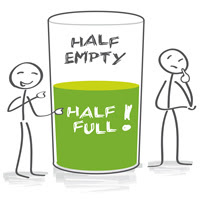Are you a glass-half-full person? (Everyday Idioms)
July 29, 2015
by Kate Woodford
A reader of this blog recently asked for a post on idioms that are used in everyday English. This seemed like a reasonable request. After all, if you are going to make the effort to learn a set of English idioms, you want those idioms to be useful. The question, then, was how to decide which idioms to write about. There are a great number of idioms in the English language, but some are rarely used. In the end, I decided to keep an idioms diary for a week, and make a note of any idioms that I heard people use in conversation. From this set of idioms, I chose a few that I considered to be common in contemporary, conversational English and have presented them here.
A reader of this blog recently asked for a post on idioms that are used in everyday English. This seemed like a reasonable request. After all, if you are going to make the effort to learn a set of English idioms, you want those idioms to be useful. The question, then, was how to decide which idioms to write about. There are a great number of idioms in the English language, but some are rarely used. In the end, I decided to keep an idioms diary for a week, and make a note of any idioms that I heard people use in conversation. From this set of idioms, I chose a few that I considered to be common in contemporary, conversational English and have presented them here.
Early in the week, a radio presenter
told his colleague that she was ‘opening up a can of worms’ when she said
something that many people would disagree with. A can of worms (informal)
is a situation or subject that causes a lot of problems or arguments when
you start to deal with it or discuss it. The verb ‘open (up)’ is often used
with this phrase. The same presenter later talked about occasions when he
really wanted to say what he thought, but instead ‘bit his tongue’. To bite your tongue is to
stop yourself from saying something that might upset someone or make them
angry.
A friend commented that her husband
was a ‘glass-half-full person’. This idiom (which has a number of variations)
is heard so often, it has become a cliché. A ‘glass-half-full person’ is an optimist, someone who
always thinks that good things will happen. Meanwhile, as you might imagine, a
‘glass-half-empty person’ is a pessimist, someone who
always thinks that bad things will happen. (The idea here is that two people
can look at the same glass and see completely different things. The optimist
sees only the drink that is still there and the pessimist only the drink that
has gone.) To express the same idea, people sometimes remark that a particular
person’s ‘glass is always half full/empty’.
Another friend, speaking about her
plans, said that she would ‘kill two birds with one stone’ by leaving her car
at a garage and then visiting a friend who lived near the garage to return a
book that she had borrowed. To kill two birds with one stone
is to succeed in achieving two things at the same time.
On the same day, a woman sitting
near me on the train told her friend that she didn’t ‘see eye to eye’ with her
sister-in-law. If you don’t see eye to eye with
someone, you have different opinions. She also complained about her brother,
saying that she was ‘tired of waiting for him to get his act together’. If you get your act together (informal),
you start to do things in an organised and effective way. The idiom can refer
either to a particular piece of work or to someone’s whole life.
At the end of the week, my sister
reported that she had ‘bitten off more than’ she ‘could chew’ with a project at
work. To bite off more than you can chew
(informal) is to try to do something that is too difficult for you or
involves too much work. This idiom reminded me of something that I frequently
say to my food-loving 8-year-old son: Your eyes are bigger than your stomach!
This is said to a person who has put too much food on their plate and cannot
eat it all.



Comments
Post a Comment